Toyota Business Model Canvas 2024
Despite its humble beginnings as a loom manufacturer, Toyota has grown into a global automotive powerhouse, revolutionizing the industry with its lean production system and commitment to quality. In this Toyota business model canvas, I will identify its customer segments, value proposition, revenue streams, channels, customer relationships, key activities, key resources, key partners, and cost structure.
Interesting fact!
Toyota owns the world’s largest indoor jungle, called “Toyota Rainforest,” located at its headquarters in Toyota City, Japan.
Toyota Competitors
Volkswagen | General Motors | Ford | Honda | Stellantis | BMW | Mercedes-Benz | Hyundai | Nissan | Tesla
Customer Segments – Toyota Business Model Canvas
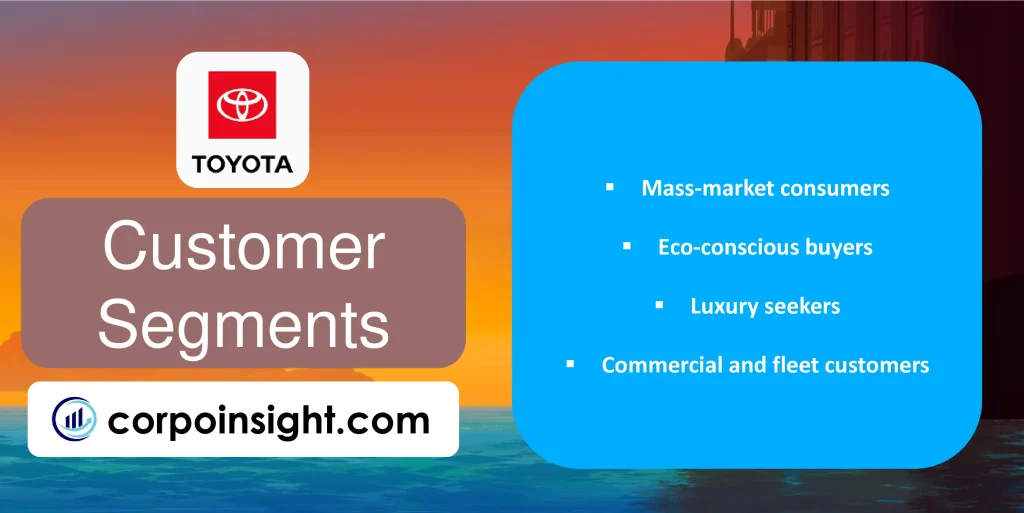
Mass-market consumers: Toyota’s core segment comprises middle-income individuals and families seeking reliable, fuel-efficient vehicles for daily use. The Corolla and Camry, consistently among the best-selling cars worldwide, exemplify Toyota’s appeal to this broad demographic, offering a balance of affordability, quality, and practicality.
Eco-conscious buyers: With the success of the Prius and the expansion of hybrid options across its lineup, Toyota has carved a significant niche among environmentally aware consumers. This segment, growing rapidly in developed markets, values fuel efficiency and reduced emissions, driving demand for Toyota’s expanding range of hybrid and electric vehicles.
Luxury seekers: Through its Lexus brand, Toyota caters to affluent consumers desiring premium vehicles with advanced features and superior comfort. This segment, while smaller than Toyota’s mass-market base, provides higher profit margins and enhances the company’s overall brand image in competitive markets like North America and Europe.
Commercial and fleet customers: Toyota serves businesses, government agencies, and rental companies with a range of vehicles suited for commercial use. The Hiace van in Asian markets and the Tundra pickup in North America exemplify Toyota’s ability to meet diverse business needs, contributing significantly to its sales volume and market presence.
Value Proposition – Toyota Business Model Canvas
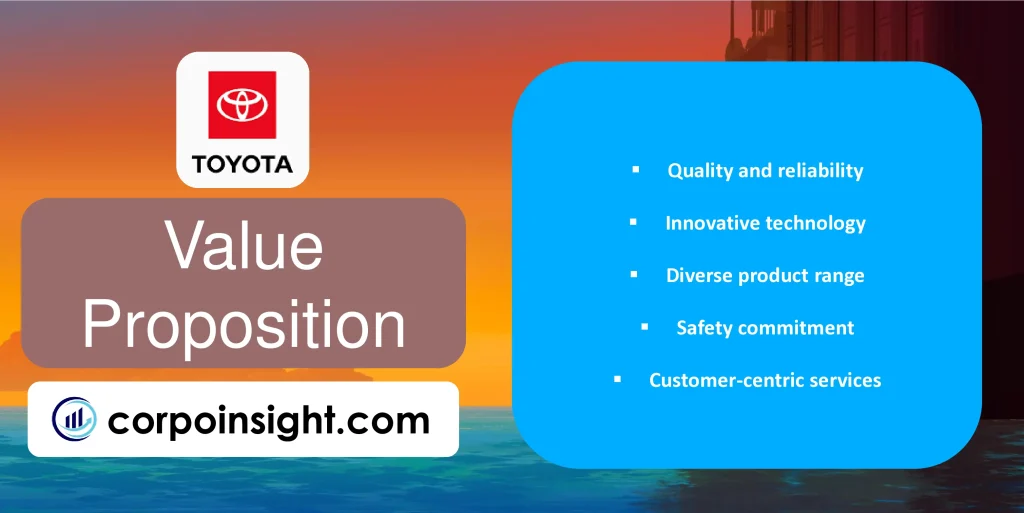
Quality and reliability: Toyota’s reputation for producing durable vehicles that retain their value over time remains a cornerstone of its proposition, with models like the Camry and RAV4 consistently ranking high in reliability studies conducted by J.D. Power and Consumer Reports.
Innovative technology: By investing heavily in research and development, Toyota offers cutting-edge features across its lineup, exemplified by its leadership in hybrid technology with the Prius, and its recent advancements in hydrogen fuel cell vehicles like the Mirai, which align with growing consumer demand for eco-friendly options.
Diverse product range: Toyota caters to a wide array of consumer needs and preferences, offering everything from compact city cars to luxury SUVs and commercial vehicles, thus ensuring that customers can find a Toyota model that fits their specific requirements and budget constraints.
Safety Commitment: Toyota’s focus on safety innovation, as evidenced by its Toyota Safety Sense package, which includes advanced driver assistance systems as standard equipment on many models, appeals to safety-conscious consumers and has contributed to improved safety ratings across its vehicle range.
Customer-centric services: Toyota enhances its value proposition through comprehensive after-sales support, including its extensive dealer network, competitive warranty offerings, and the My Toyota app, which provides personalized vehicle management and maintenance services, thereby fostering long-term customer relationships and brand loyalty.
Revenue Streams – Toyota Business Model Canvas
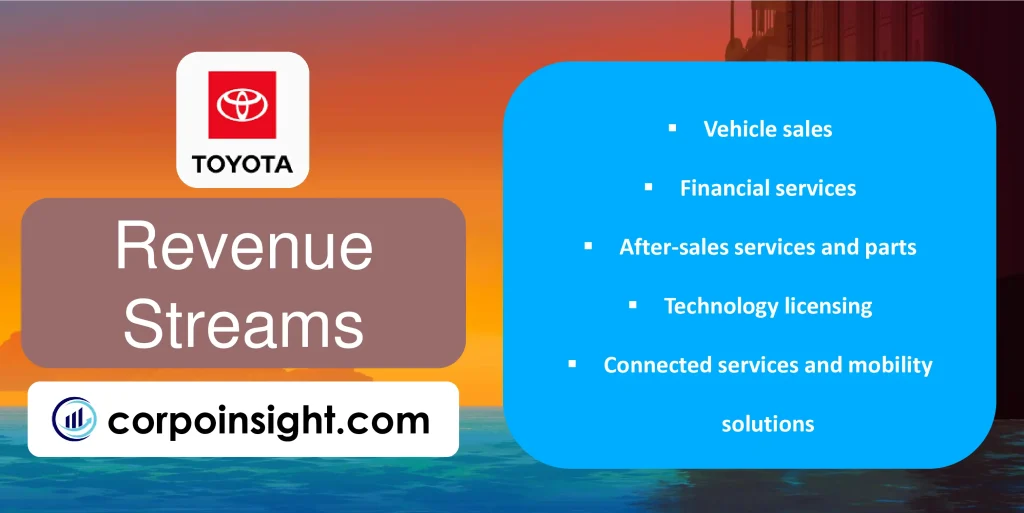
Vehicle sales: The primary revenue generator for Toyota, accounting for approximately 90% of its total revenue, comes from the sale of passenger cars, trucks, and commercial vehicles across its brands, including Toyota, Lexus, and Daihatsu, with the RAV4 and Corolla being top sellers globally.
Financial services: Toyota Financial Services, offering leasing, financing, and insurance products to customers and dealers, contributes significantly to the company’s revenue, generating over $20 billion annually and providing a stable income stream that complements the cyclical nature of vehicle sales.
After-sales services and parts: Revenue from maintenance, repairs, and genuine Toyota parts sales forms a crucial and steady income stream, with the company’s extensive dealer network and reputation for reliability driving consistent customer engagement in this high-margin segment.
Technology licensing: Toyota’s innovative technologies, particularly in hybrid and fuel cell systems, generate revenue through licensing agreements with other manufacturers, exemplified by its partnership with Subaru for hybrid technology, thus monetizing its R&D investments beyond its product line.
Connected services and mobility solutions: Emerging revenue streams from connected car services, subscription-based features, and mobility services like car-sharing platforms represent Toyota’s adaptation to changing consumer preferences and technological advancements in the automotive industry.
Channels – Toyota Business Model Canvas
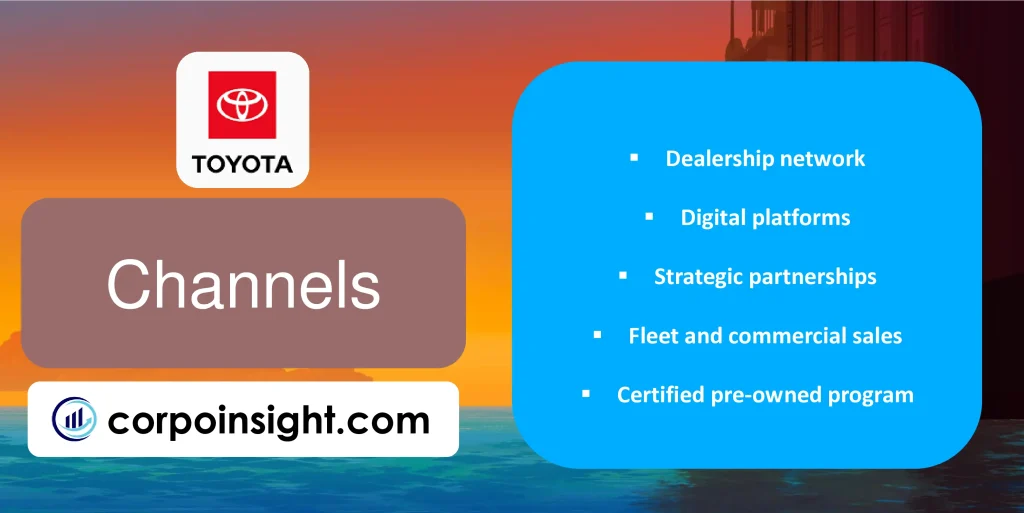
Dealership network: Toyota’s extensive global network of over 8,500 dealerships serves as its primary sales channel, offering personalized customer service, test drives, and after-sales support, while the company’s “Toyota New Global Architecture” initiative aims to streamline and modernize these dealerships to enhance the customer experience.
Digital platforms: Recognizing the shift towards online car shopping, Toyota has invested heavily in its digital presence, with its website and mobile apps now offering virtual showrooms, online configurators, and even direct purchasing options in some markets, thus catering to the growing segment of digitally-savvy consumers.
Strategic partnerships: Toyota leverages partnerships with ride-sharing companies like Uber and Grab, as well as with tech giants such as Amazon and Microsoft, to explore new distribution channels and mobility solutions, thereby extending its reach beyond traditional car ownership models.
Fleet and commercial sales: Through dedicated fleet departments and specialized dealerships, Toyota targets businesses, government agencies, and rental companies, offering tailored solutions and bulk purchasing options for models like the Camry and Hilux, which helps secure large-volume sales and long-term contracts.
Certified pre-owned program: Toyota’s certified pre-owned vehicle program serves as an additional channel, attracting budget-conscious consumers and first-time buyers while maintaining brand loyalty, with the company reporting a 6% increase in certified pre-owned sales in 2022 compared to the previous year.
Customer Relationships – Toyota Business Model Canvas
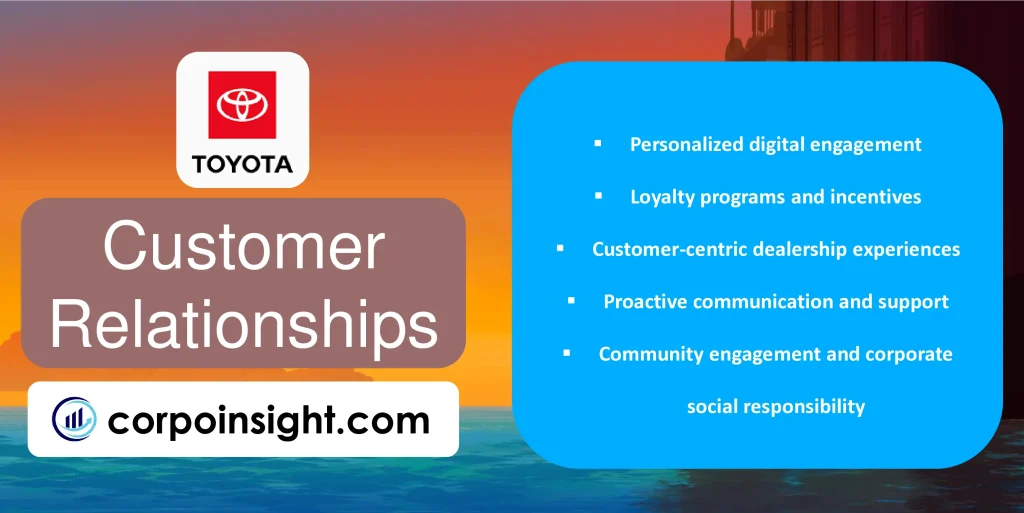
Personalized digital engagement: Toyota has significantly enhanced its digital customer relationship management, exemplified by the my Toyota app, which offers personalized vehicle information, maintenance reminders, and connected services, thereby fostering a more interactive and tailored relationship with over 5 million active users worldwide.
Loyalty programs and incentives: The Toyota Rewards Visa program and various regional loyalty initiatives provide customers with points on purchases and services, which can be redeemed for vehicle maintenance or future purchases, thus encouraging long-term brand loyalty and repeat business across Toyota’s product lines.
Customer-centric dealership experiences: Toyota’s ongoing “Customer First” initiative focuses on transforming dealerships into experience centers, incorporating technologies like virtual reality for car customization and test drives, while also emphasizing staff training to provide more personalized and knowledgeable service to customers.
Proactive communication and support: Toyota’s commitment to customer care is evident in its proactive recall management and transparent communication during crises, as demonstrated during the 2021 chip shortage, where the company maintained open lines of communication with customers about potential delays and alternative options.
Community engagement and corporate social responsibility: Toyota builds customer relationships beyond vehicle ownership through initiatives like the Toyota Environmental Challenge 2050 and local community programs, which resonate with socially conscious consumers and enhance the brand’s reputation for corporate citizenship.
Key Activities – Toyota Business Model Canvas
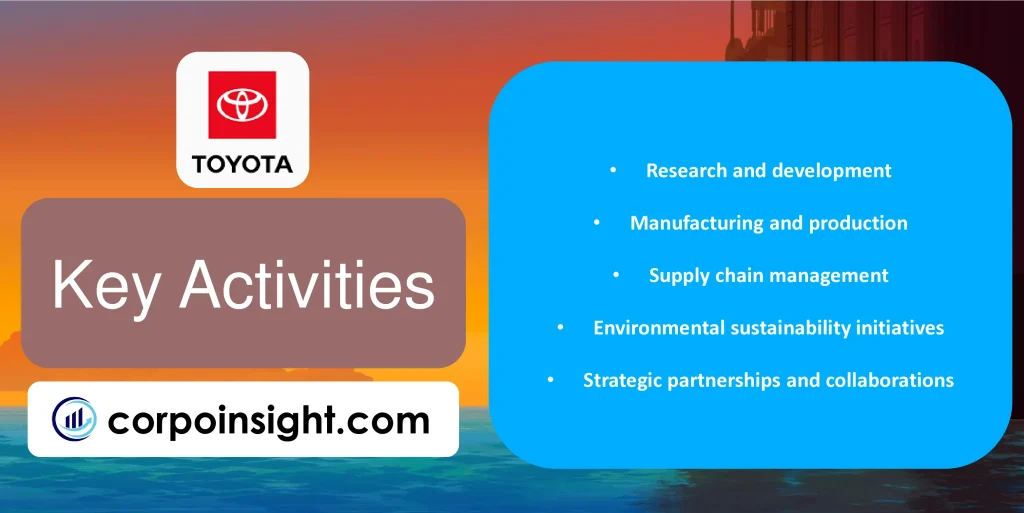
Research and development: Toyota’s substantial investment in R&D, amounting to approximately $9.5 billion in 2022, focuses on advancing electric vehicle technology, autonomous driving systems, and artificial intelligence, exemplified by the development of solid-state batteries and the e-Palette concept vehicle for mobility services.
Manufacturing and production: The company’s renowned Toyota Production System continues to evolve, incorporating Industry 4.0 technologies such as IoT and AI to enhance efficiency and quality control, while its commitment to localized production is evident in recent expansions like the $1.3 billion investment in its Indiana plant for electric vehicle production.
Supply chain management: Toyota’s robust supply chain strategy, which emphasizes risk mitigation and supplier diversification, has proven resilient during recent global disruptions, as demonstrated by its ability to maintain production levels better than many competitors during the 2021-2022 semiconductor shortage.
Environmental sustainability initiatives: In line with its Environmental Challenge 2050, Toyota is actively transitioning towards carbon neutrality in its operations and products, with key activities including the development of hydrogen fuel cell technology, expansion of its hybrid and electric vehicle lineup, and implementation of sustainable manufacturing practices across its global facilities.
Strategic partnerships and collaborations: Toyota engages in numerous strategic alliances to accelerate innovation and market penetration, such as its partnership with Panasonic for battery technology, collaboration with Uber for autonomous vehicle development, and joint venture with SoftBank for mobility services, positioning itself at the forefront of automotive industry transformation.
Key Resources – Toyota Business Model Canvas
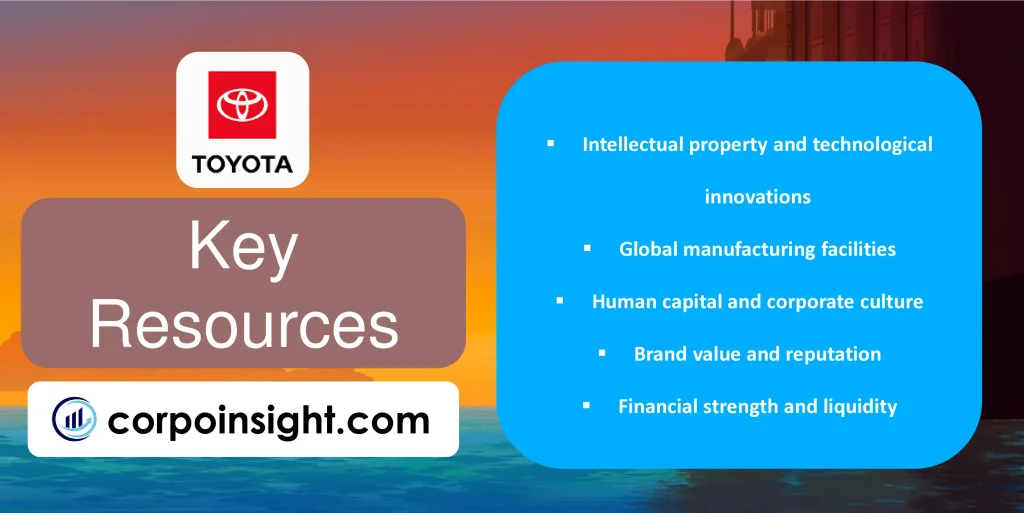
Intellectual property and technological innovations: Toyota’s vast portfolio of patents, particularly in hybrid and fuel cell technologies, remains a critical resource, with the company holding over 26,000 patents related to electrification alone, thereby maintaining its competitive edge in the rapidly evolving automotive landscape.
Global manufacturing facilities: Toyota’s extensive network of 50+ manufacturing plants across 28 countries ensures production flexibility and market responsiveness, with recent investments like the $1.3 billion upgrade to its Kentucky plant for electric vehicle production demonstrating the company’s commitment to adapting its manufacturing resources to future market demands.
Human capital and corporate culture: The company’s workforce of over 360,000 employees globally, coupled with its deeply ingrained kaizen philosophy of continuous improvement, serves as a invaluable resource for innovation and operational excellence, as evidenced by Toyota’s consistently high rankings in employee satisfaction surveys.
Brand value and reputation: Toyota’s brand, valued at approximately $59.7 billion in 2022 according to Interbrand, represents a significant intangible resource, with its reputation for quality and reliability continuing to drive customer loyalty and market share across diverse global markets.
Financial strength and liquidity: With total assets exceeding $590 billion as of 2022, Toyota’s robust financial position provides the company with the flexibility to invest in emerging technologies, weather market uncertainties, and pursue strategic opportunities, as demonstrated by its ability to maintain R&D spending even during global economic downturns.
Key Partners – Toyota Business Model Canvas
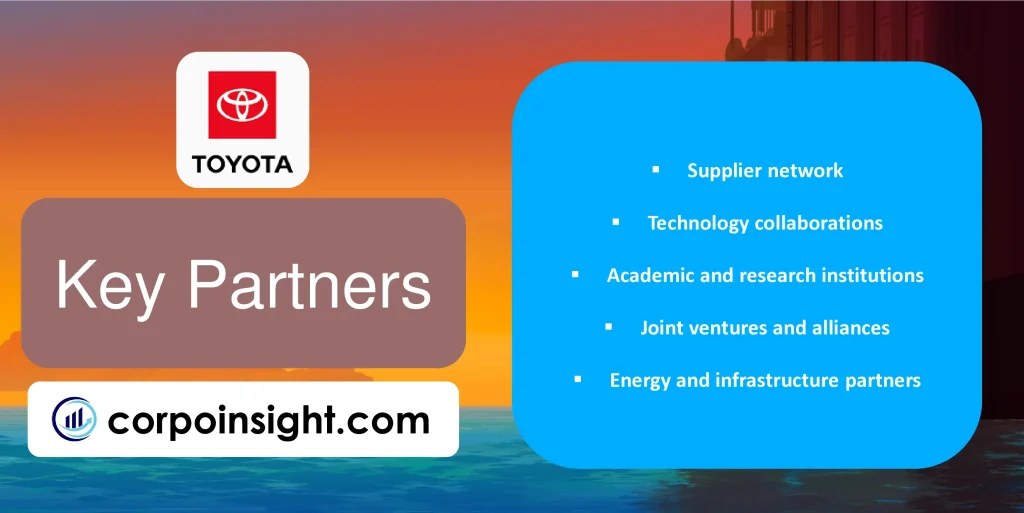
Supplier network: Toyota’s extensive network of over 3,000 suppliers globally forms a crucial partnership, with the company’s recent “Partnership-based Procurement” initiative emphasizing collaborative innovation and risk-sharing, as exemplified by its joint development of fuel cell systems with Denso and Aisin Seiki.
Technology collaborations: Strategic partnerships with tech giants and startups alike drive Toyota’s innovation in autonomous vehicles and mobility services, notably its ongoing collaboration with Nvidia for AI computing infrastructure and its $400 million investment in Pony.ai for self-driving technology development.
Academic and research institutions: Toyota’s partnerships with universities and research centers worldwide, such as its $50 million collaboration with Stanford University and MIT for AI research, facilitate cutting-edge R&D in areas like artificial intelligence, robotics, and materials science, ensuring a pipeline of innovative technologies.
Joint ventures and alliances: Toyota’s numerous joint ventures, including Toyota Peugeot Citroën Automobile in Europe and GAC Toyota in China, enable market entry and localized production, while its alliance with Mazda for electric vehicle technology sharing demonstrates the company’s commitment to collaborative industry advancement.
Energy and infrastructure partners: As Toyota pushes towards sustainable mobility, partnerships with energy companies and governments for hydrogen infrastructure development have become increasingly vital, exemplified by its collaboration with Shell for hydrogen refueling stations in California and its joint venture with four other Japanese automakers to advance hydrogen technology.
Cost Structure – Toyota Business Model Canvas
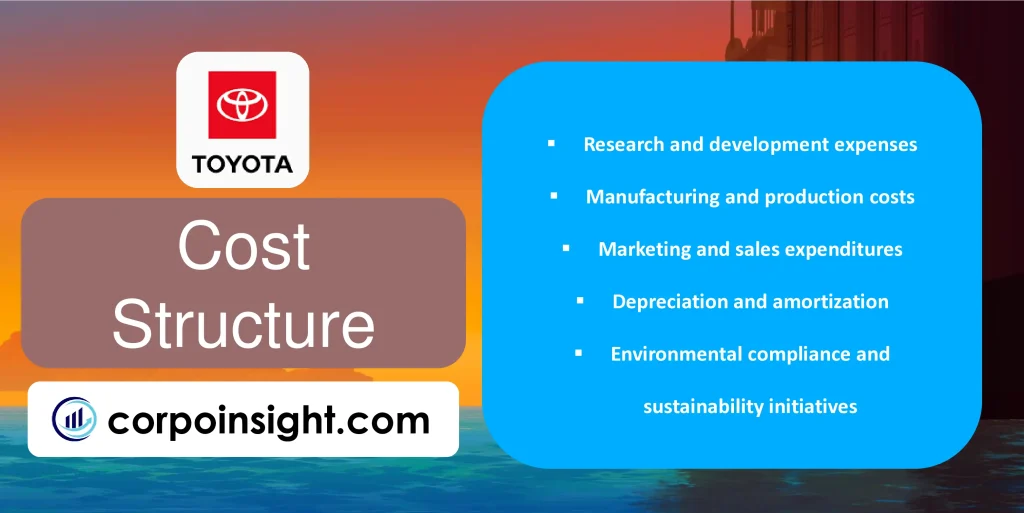
Research and development expenses: Toyota’s substantial R&D investment, which reached approximately 1.1 trillion yen ($8.3 billion) in FY2022, represents a significant cost center, focusing on electric vehicle technology, autonomous driving systems, and connected car solutions, reflecting the company’s commitment to maintaining its competitive edge in an rapidly evolving automotive landscape.
Manufacturing and production costs: While Toyota’s lean manufacturing principles help control costs, the company still faces substantial expenses in raw materials, labor, and energy, with recent inflationary pressures and supply chain disruptions leading to a 11.7% increase in operating costs in FY2022, necessitating ongoing efficiency improvements and strategic sourcing initiatives.
Marketing and sales expenditures: Toyota’s global marketing efforts, including advertising, promotions, and dealer support, constitute a considerable portion of its cost structure, with the company reporting 1.3 trillion yen ($9.8 billion) in selling, general, and administrative expenses in FY2022, underlining the importance of maintaining brand visibility and customer engagement across diverse markets.
Depreciation and amortization: As a capital-intensive business, Toyota incurs significant depreciation costs related to its manufacturing facilities, equipment, and technologies, with depreciation expenses reaching 1.2 trillion yen ($9.1 billion) in FY2022, reflecting the ongoing need for investment in modernizing and expanding production capabilities.
Environmental compliance and sustainability initiatives: Toyota’s commitment to environmental sustainability, exemplified by its Environmental Challenge 2050, incurs substantial costs in developing eco-friendly technologies, upgrading facilities for reduced emissions, and ensuring compliance with increasingly stringent global environmental regulations, representing a growing component of the company’s overall cost structure.
Summary of Toyota Business Model Canvas
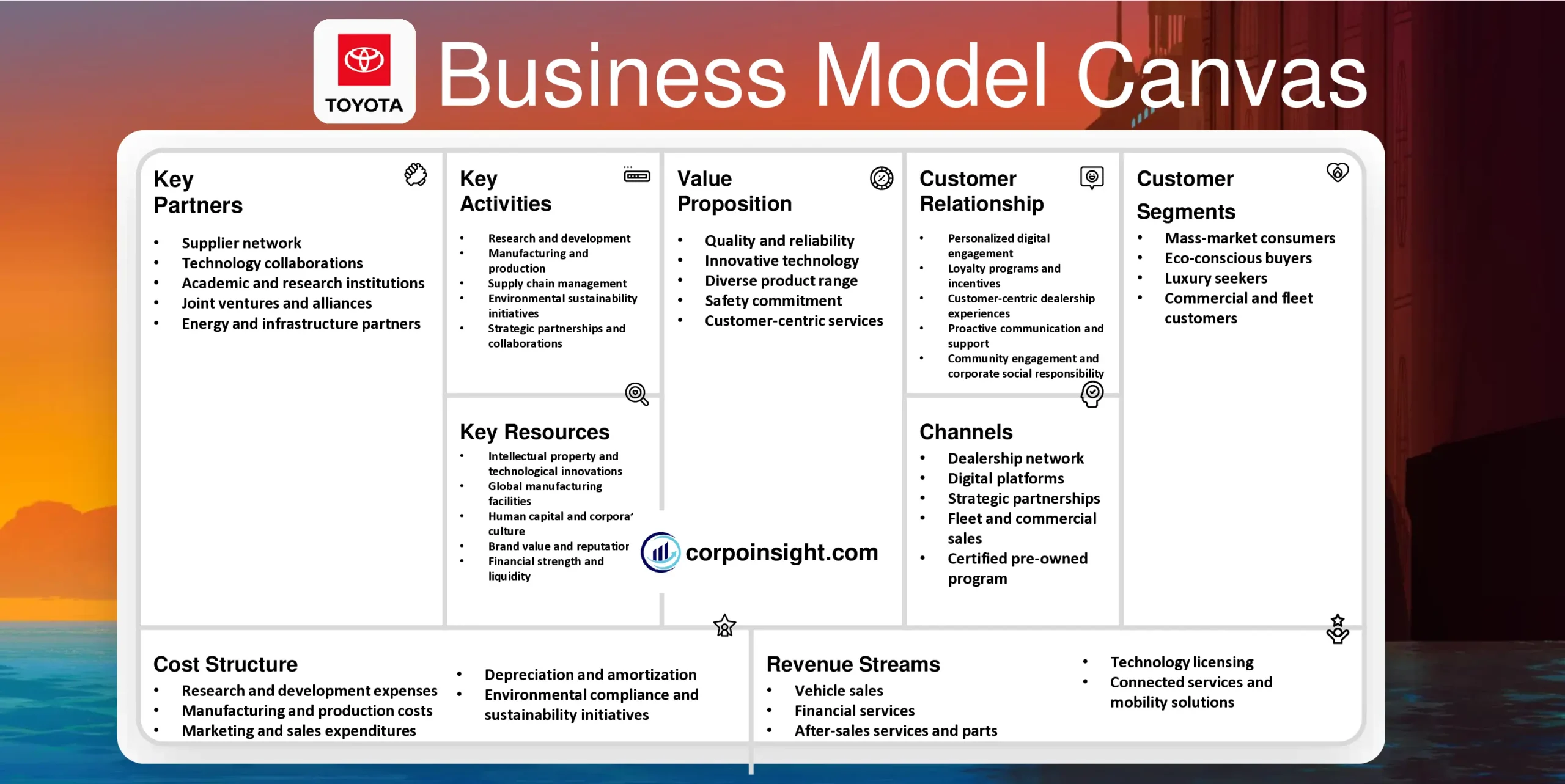
Conclusion on Toyota Business Model Canvas
Toyota’s Business Model Canvas reveals a robust and adaptive strategy that has positioned the company as a global automotive leader. By leveraging its strong brand, extensive dealer network, and commitment to innovation, Toyota balances mass-market appeal with targeted segments like eco-conscious consumers. The company’s focus on quality, reliability, and sustainability, coupled with strategic partnerships and efficient cost management, enables it to navigate industry disruptions and maintain a competitive edge in the rapidly evolving automotive landscape.

Hi! I am Mohammad Safayet Hossain, pursuing my BBA in Marketing at the Bangladesh University of Professionals. As a business student, I am passionate about learning about various companies and industries and am here to share them with you.






